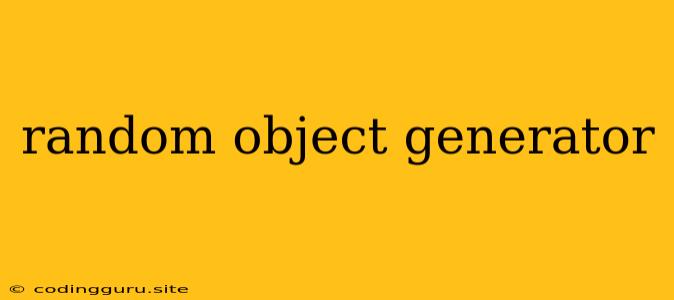Need to generate random objects? Let's explore the possibilities!
Creating random objects can be incredibly useful for various applications, from testing and prototyping to data generation and creative projects. Let's delve into some of the most common ways to tackle this task, along with examples and considerations.
Why Generate Random Objects?
The need to generate random objects arises in diverse scenarios. Consider these common uses:
- Testing & Prototyping: Creating mock data for software testing and building prototypes.
- Data Generation: Populating databases with realistic-looking data for training machine learning models or conducting simulations.
- Game Development: Generating random items, characters, or events in games to enhance gameplay.
- Creative Projects: Using random elements to create unique content, like poems, stories, or artwork.
Methods for Generating Random Objects
Let's dive into some popular methods for generating random objects in different programming languages and contexts.
1. Using Libraries & Frameworks:
Many programming languages and frameworks offer dedicated libraries for random object generation.
Python:
- random: The
randommodule in Python provides functions for generating random numbers, choices, and more.import random class Person: def __init__(self, name, age): self.name = name self.age = age names = ["Alice", "Bob", "Charlie", "David", "Eve"] ages = range(18, 65) def generate_random_person(): return Person(random.choice(names), random.choice(ages)) for _ in range(5): person = generate_random_person() print(f"Name: {person.name}, Age: {person.age}")
JavaScript:
- Math.random(): The
Math.random()function in JavaScript produces a random floating-point number between 0 and 1 (exclusive).function generateRandomObject() { return { id: Math.floor(Math.random() * 1000), // Random ID between 0 and 999 name: ['Alice', 'Bob', 'Charlie'][Math.floor(Math.random() * 3)], age: Math.floor(Math.random() * (50 - 18 + 1)) + 18 // Random age between 18 and 50 }; } for (let i = 0; i < 5; i++) { console.log(generateRandomObject()); }
Java:
- Random: The
Randomclass in Java provides methods for generating various random numbers, including integers, doubles, and booleans.import java.util.Random; class Product { int id; String name; double price; public Product(int id, String name, double price) { this.id = id; this.name = name; this.price = price; } } public class RandomObjectGenerator { public static void main(String[] args) { Random random = new Random(); String[] productNames = {"Laptop", "Phone", "Tablet", "Headphones"}; for (int i = 0; i < 5; i++) { int id = random.nextInt(1000); String name = productNames[random.nextInt(productNames.length)]; double price = random.nextDouble() * 1000; // Price between 0 and 1000 Product product = new Product(id, name, price); System.out.println(product.id + ", " + product.name + ", " + product.price); } } }
2. Using JSON Schemas:
JSON schemas offer a structured way to define the format and properties of your objects, making it easier to generate random objects that conform to specific specifications.
JSON Schema Examples:
-
Person Schema:
{ "type": "object", "properties": { "firstName": { "type": "string" }, "lastName": { "type": "string" }, "age": { "type": "integer", "minimum": 18, "maximum": 65 } }, "required": ["firstName", "lastName", "age"] } -
Product Schema:
{ "type": "object", "properties": { "id": { "type": "integer" }, "name": { "type": "string" }, "price": { "type": "number", "format": "float" }, "category": { "type": "string", "enum": ["Electronics", "Clothing", "Books"] } }, "required": ["id", "name", "price", "category"] }
Tools & Libraries for JSON Schema Random Object Generation:
- faker.js: This popular library provides various methods for generating fake data, including objects based on JSON schemas.
- JSON Schema Faker: A dedicated tool for generating random objects from JSON schemas.
- JSON Generator: Offers online tools and APIs for generating JSON data from schemas.
3. Manual Generation:
For simple use cases or custom object structures, you can manually generate random objects by combining basic random functions with your object creation logic.
Example:
function generateRandomBook() {
const titles = ['The Lost City', 'Whispers of the Wind', 'Secrets of the Ancients'];
const authors = ['Jane Doe', 'John Smith', 'Emily Brown'];
return {
title: titles[Math.floor(Math.random() * titles.length)],
author: authors[Math.floor(Math.random() * authors.length)],
pages: Math.floor(Math.random() * (500 - 100 + 1)) + 100, // Random pages between 100 and 500
genre: ['Fantasy', 'Mystery', 'Romance'][Math.floor(Math.random() * 3)]
};
}
console.log(generateRandomBook());
Tips for Generating Random Objects:
- Control Randomness: Ensure that your random objects are actually random. Consider using libraries with strong random number generators.
- Realistic Data: Strive for realism in your generated data. For example, when generating ages, ensure they fall within a reasonable range.
- Constraints & Relationships: If your objects need to adhere to specific constraints or relationships, incorporate them into your generation process.
Conclusion:
Generating random objects provides a versatile approach to handling various tasks, from testing and prototyping to data generation and creative projects. By leveraging libraries, JSON schemas, and manual techniques, you can effectively create random objects that meet your specific requirements. Remember to consider realism, constraints, and the quality of your random number generation to ensure the effectiveness and validity of your random objects.
